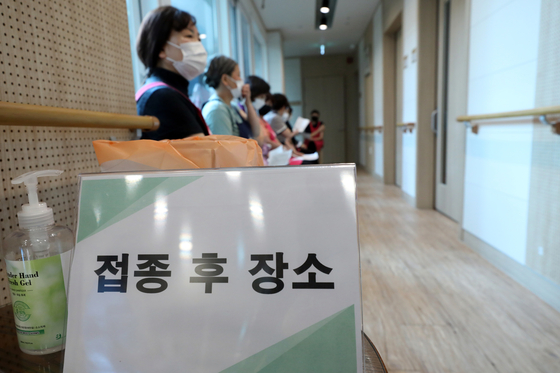
On the morning of the 10th, hospital officials are waiting to check for adverse reactions after receiving a new coronavirus infection (Corona 19) AstraZeneca (AZ) vaccination at Jeongdown Nursing Hospital in Yangcheon-gu, Seoul. News 1
As vaccinations against the novel coronavirus infection (Corona 19) are increasing day by day, reports of adverse reactions are also increasing.
According to the Korea Centers for Disease Control and Prevention on the 15th, the reporting rate of adverse reactions to those who received the vaccine was 1.9% for the AstraZeneca (AZ) vaccine and 0.4% for the Pfizer vaccine. The AZ vaccine is 4.75 times that of Pfizer. The AZ vaccine may seem very problematic.
However, the AZ vaccine significantly reduced adverse reactions at the second dose, and the Pfizer vaccine increased at the second dose. When the Korea Centers for Disease Control and Prevention analyzed the papers in clinical trials (2nd and 3rd clinical trials) of the two vaccines, the incidence of adverse reactions within 7 days after vaccination came out like this. Both vaccines should be given twice. The AZ vaccine is administered 8 to 12 weeks after the first vaccination, and Pfizer is administered the first vaccination 3 weeks after the first vaccination.
The most uncomfortable adverse reactions to inoculations are muscle pain, headache, and fever. More so because it’s a general condition.

Adverse reactions within 7 days after vaccination_AstraZeneca. Graphic = Younghee Kim [email protected]
The AZ vaccine showed muscle pain in 53% of the 1st inoculations aged 18 to 55 years old. However, at the second dose, it was reduced to 35%. Headaches fell in half from 65% to 31%. Fever occurred in 24% of the patients in the first inoculation, but none in the second inoculation. Among the 18-55 year old inoculations, the number of people complaining of fatigue decreased from 76% in the first to 55% in the second.
Among the 56-69 years old, muscle pain decreased from 37% to 24%, and headaches decreased from 50% to 34%. There was no fever in both primary and secondary.
The symptoms of pain and stiffness at the injection site were also lower in the second dose than in the first dose in all age groups. For those over 70 years old, the injection site pain decreased from 20% of the first inoculation to 10% of the second inoculation. No one over 70 years of age showed fever symptoms in both the 1st and 2nd vaccinations.
Pfizer vaccines generally showed the opposite trend.
Myalgia was complained by 21% of the first inoculations aged 16 to 55 years old, but increased to 37% in the second. Chills rose from 14% to 35%, and joint pain from 11% to 22%. Fever jumped from 4% to 16%. The headache also rose a little. Because of adverse reactions, the proportion of people who took painkillers increased from 28% in the first to 45% in the second.

Adverse reactions within 7 days after vaccination_Pfizer. Graphic = Younghee Kim [email protected]
Those over the age of 56 got worse.
Fever rose from 1% to 11%, chills from 6% to 23%, joint pain from 9% to 19%, and muscle pain from 14% to 28%. The percentage of complaining of fatigue increased from 23% to 51%. The rate of use of pain medications also doubled from 20% to 38%.
An official from the Agency for Disease Control and Prevention said, “There is a high rate of complaining of adverse reactions after receiving the AZ vaccine, so I am concerned that the second dose will be avoided. However, if you look at the data from the clinical trial, it will be significantly reduced after the second dose, so you may be less worried. . He said, “I want you to pay attention to the fact that fever, chills, and muscle pain, which can be seen as symptoms of the whole body, decrease after the second vaccination,” he said. The official said, “However, I am worried that the Pfizer vaccine will be more difficult after the second dose.
Reporter Shin Seong-sik [email protected]
![]()
